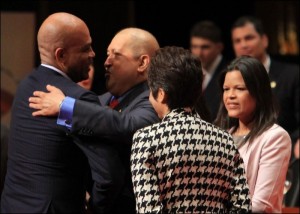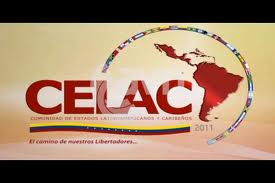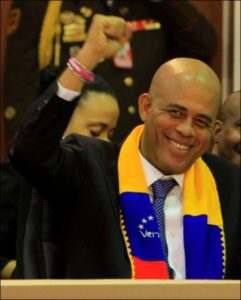
President Martelly welcomed by President Chavez source: Le Nouvelliste
“The Venezuelan cooperation is now number one,” said President Michel Martelly shortly before boarding his plane to Caracas, land of Hugo Chavez. “It gives most grants and aids to Haiti,” added the president at Toussaint Louverture airport’s diplomatic room ahead of his first official trip to Venezuela as a member of the Community of Latin American and Caribbean States (CELAC).
Venezuela’s pledge of $1.3 billion in recovery aid to Haiti after the earthquake slightly surpassed U.S.’s $1.2 billion pledge, making Caracas the largest among all 58 donors. To that, President Martelly said, “We are grateful to President Chavez for Helping us from the bottom of his heart,” in a recent Associated Press interview. “Sometimes for a simple project, it might take too long for the project to happen,” explained the Haitian president, specifically referring to strict conditions accompanying the U.S.’s and other donors’ aids. “If you’re asking me which one flows better, which one is easier,” added Martelly, “I’ll tell you Venezuela.”
This presidential trip to the Venezuelan capital was also part of a larger event: the launching of new 33-member regional bloc CELAC away from Washington and Canada’s shadows. During the two-day summit held form Dec. 2 – Dec.3, 2011, leaders focused on shielding their economies from the world’s financial meltdown. In spite of global economic woes, the Latin American region achieved a 5 percent economic growth last year. “The economic crisis should be at the center of our concerns,” said Dilma Rousseff who felt the region needed a new paradigm to respond to the crisis. “Together we can be stronger, together we can grow and that should be stronger for everyone,” she added. Her homologous partner Chavez went straight to the point, noting, “As the years go by, CELAC is going to leave behind the old and worn-out OAS,” referring to the Organization of American States, the Hemisphere’s arbitration entity. “Only Unity will make us free,” he later added.
Whether Haiti, a relatively small fish with a foreign aid economic model, can swim huge currents, as do autonomous economies such as OPEC country Venezuela or Dilma Rousseff’s Brazil, currently nursing the world’s fastest growing economy, remains to be determined. Nevertheless, Port-au-Prince’s warm embrace of Caracas differed vastly from that of his predecessor Rene Preval who looked upon Chavez’s motives with suspicions. With the exception of Brazil and Chile, where China has a strong foothold, the U.S. remains the biggest trading partner of many countries in the region. Yet, Chinese President Hu Jintao’s congratulatory letter, which Chavez read aloud to all 33 regional leaders, pledged to deepen cooperation with the new group, development that could shift the region’s geopolitical balance considerably.
Amid this distinct geopolitical puzzle, some observers noticed the emergence of Martelly’s foreign policy model, gearing his country toward his regional allies in search of sovereignty, rather than rigid Washingtonian conditions who stood between him and his army. Only the future will tell if Martelly’s regional play will favor Haiti’s long-term interests, but the president remained true to his ideals. “Now, if nobody wants to help, then we have to think about a way of getting that money,” said the president to the AP about his dream to reestablish the Haitian army. “But at the same time,” he continued. “Why do we need a foreign army to help us? A foreign army that’s costing much more money, why not hire young Haitians? Why not regain our sovereignty?”

Martelly welcomed at CELAC source: Le Nouvelliste
Although he told the AFP in an interview this weekend, “We no longer want handouts, we want to promote Haiti” in his quest to dissociate his country’s imagery with poverty and misery, President Martelly praised a CELAC’s resolution, promising vast contributions to help rebuild Haiti. Contributing countries included, Ecuador in several areas including security, Columbia in security and education, Chile in education to build 10 schools, and Panama that promised to ease travel restrictions for Haitians. A $40 million grant from Brazil will help restart construction of Artibonite’s hydroelectric plant while the new program “Aba Grangou” promised to reach about 100,000 vulnerable single moms with needed assistance starting January 2012.
However, If Washington’s reaction, still unknown, resembles anything like the 1,918 Haiti-related diplomatic cables revealed by whistleblowing website Wikileaks last summer, President Martelly may soon have a rude awakening as did his predecessor. “What emerges,” wrote the editors of the Nation about the diplomatic cables, “Is an extraordinary portrait of Washington’s aggressive management of Latin America’s first sovereign nation and its bare-knuckled tactics on behalf of U.S. corporate interest there.” If as the Nation deducted, the Haiti cables revealed Washington squaring off against Caracas and Havana, while Beijing and Taipei engaged in fierce diplomatic arm-wrestling that threatened to derail the UN military mission in Haiti, Martelly’s foreign policy shift toward regional allies could prove insurmountable.
Nonetheless, the president held nothing back expressing his frustration with the international community. “I’m the leader of a country that has been neglected for the last 200 years,” he stressed to AFP’s Ramon Sahmkow. “It is my responsibility to bring development to Haiti.”